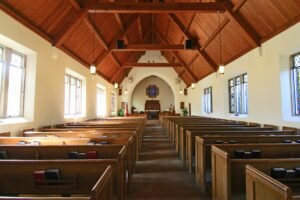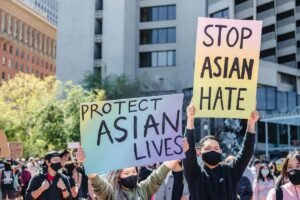October 26, 2015; Pew Research Center
This past summer, NPQ wrote about a spate of arsons at black churches. In the St. Louis area, there have been at least seven suspected arsons during a two-week period in October, and six of the seven properties were black churches in the vicinity of Ferguson, the inner-ring suburb that more than a year ago bore witness to the killing of an unarmed black teen by a white police officer who subsequently was not indicted.
One of the church leaders whose building was targeted by the arsonist or arsonists was left perplexed not by the incident, but by the reaction. Rev. Rodrick Burton, pastor at the New Northside Missionary Baptist Church, expressed some disillusionment with the lackluster response from his peers in the faith community. Burton cited the symbolic significance of church arsons, noting that several of his parishioners had lived through the history of the American Civil Rights Movement when “church fires were not taken seriously by the authorities.”
It takes only a passing familiarity with modern American history to be aware of the bombing of the 16th Street Baptist Church in 1963, an instance of domestic terrorism committed by four leaders of the Ku Klux Klan resulting in the deaths of four young girls and injuries to 22 other parishioners. Many people say that the reaction to that church bombing played a huge role in spurring support for the Civil Rights Act of 1964. For people who lived through that era of multiple church arsons and bombings, the meaning of these incidents goes beyond matters of simple crime. “The bombing and burning of Black churches translated into an attack upon the core of civil rights activism, as well as upon the larger Black community,” wrote Michele SimmsParris in a law review article in 1998. “In the end, the message of racial hate was burned into the memories of African-Americans and revisits us every time one of our churches burn.”
Sign up for our free newsletters
Subscribe to NPQ's newsletters to have our top stories delivered directly to your inbox.
By signing up, you agree to our privacy policy and terms of use, and to receive messages from NPQ and our partners.
The Pew Research Center reports that church arsons have been declining over the past two decades, from 209 in 1997 down to 122 in 2007 to 42 in 2014 and 29 so far in 2015. Does that mean that the spate of black church arsons in the St. Louis area might be an aberration, not connected to or motivated by racism?
A few people have suggested that the motivation of the arsonists might have been an attack on religion, not an expression of violent racism. While there has been no specific identification of the St. Louis arsonists, it seems an unlikely coincidence that someone’s problem with religion only gets expressed through lighting fires in the doorways of black churches. At a local unity service at one of the targeted churches, a white Episcopalian minister, Rev. Mike Kinman of Christ Church Cathedral in St. Louis, expressed the obvious truth: “Holy God…if we ever needed a wake-up call to believe that racism is alive in St. Louis—if this is not it, I don’t know what it could be.” The symbolic importance of black churches was not lost on the Klan members who bombed the 16th Street Church in Birmingham, and it isn’t likely lost on the arsonists behind today’s church burnings.
The possible counter is that in the wake of Ferguson and other incidents of racial bias, we might all be falling prey to “confirmation bias”—that is, interpreting the data to see what we want or expect to see. That would be true were it not for these seven arsons all hitting black churches in a small geographic area where racial tensions have been high. Perhaps the summer’s multi-state church arsons were a mix of racial targeting and other motivations, but it is hard to read seven arsons at black churches in a radius of only a few miles of Ferguson as anything but racially motivated.
It may be time to revive the Clinton-era National Church Arson Task Force and acknowledge that after racial violence in places ranging from a historic black church in Charleston, South Carolina, to a playground in Cleveland, Ohio, to a traffic stop in Waller County, Texas, to a commercial thoroughfare in Ferguson, Missouri, the times are different and warrant societal action against black church arsons and the racial animus that inspires them.—Rick Cohen












